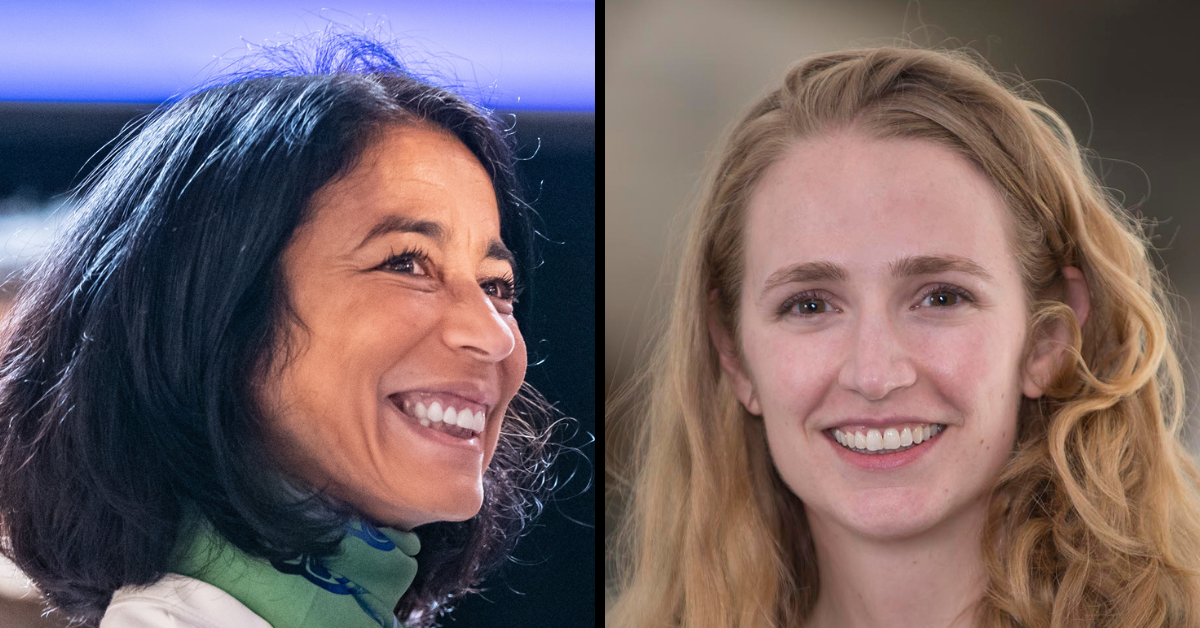Catalysing a perspective shift in cancer research
Q&A with Scientific Committee member Miriam Merad and think tank participant Lydia Finley
We talk to Miriam and Lydia to get their take on the think tank process, why the Cancer Grand Challenges approach is required, and what Miriam hopes to bring to the Scientific Committee.
Innovation at the interface
Miriam Merad is one of our newest members of the Cancer Grand Challenges Scientific Committee. She is a leading immunologist, working to understand and exploit macrophage and dendritic cell biology in cancer and inflammatory disease, with her lab’s most recent work highlighting the role of an ageing immune system in promoting cancer. One of her first tasks for Cancer Grand Challenges was to co-chair our challenge consultation think tank in New York, together with head of the Scientific Committee Charlie Swanton. The think tank, which was co-hosted by The Mark Foundation for Cancer Research at the New York Genome Center, will be critical in shaping the challenges that we will put to the community in March 2025.
Lydia Finley, whose laboratory at the Memorial Sloan Kettering Cancer Center has helped to uncover the role of metabolic networks in the control of cell fate programs in both normal and cancerous cells, was one of the think tank participants.
We talked to Lydia and Miriam about the unusual opportunity these think tanks present and how innovation is found at the interface of fields.
Miriam, welcome to the Scientific Committee! Why are you excited to co-chair this think tank?
Miriam: I’ve always admired the unique, bold questions Cancer Grand Challenges tackles and the intellectual model it has built around how to approach these questions. Being part of a think tank that draws on diverse expertise to identify a shared challenge is very exciting. This group brings varied focuses and specialties, and our challenge together is to identify the most pressing gaps to address. Scientists are always trying to uncover critical knowledge gaps and find the most impactful ways to close them. The realisation that we can rally so many minds and significant funding to do this is extraordinary.
Lydia, why are you excited to attend?
Lydia: I think it's an unusual opportunity to think deeply about what the biggest questions are in cancer biology, and what would be required to accomplish true breakthroughs. Often in our day-to-day, we focus on our own questions, our own line of enquiry. But to take a step back and think about what we could do if we could answer anything is an exciting opportunity to really stretch the bounds of our thinking.
And what do you think the Cancer Grand Challenges’ approach brings?
Lydia: First to allow this perspective shift. So moving from, ‘What can my lab accomplish? What can we contribute?’ to, ‘What needs to be accomplished? What needs to happen for us to measurably change the diagnosis or treatment of cancer?’ This is important because regardless of what happens with Cancer Grand Challenges, I'll take that perspective shift back to my own lab and think harder about where we can tackle new and important questions.
Separately, bringing people together in a global way reinforces the fact that we all are a community and we all are ultimately driven by the same mission. I think it's important to remind us as scientists that we are teammates and that we're a part of a global ecosystem working together.
I also appreciate the scientific impetus that it gives to really put money behind tackling hard questions and bringing different disciplines together in a way that's required to address big questions.
Miriam why do you think we need this interdisciplinary approach?
Miriam: Innovation thrives at the intersection of fields. I have worked at the interface of haematopoiesis and immunology, and this intersection has led me to uncover new questions and gaps. Bringing experts from different domains enables them to articulate their perspective on a problem, creating a dynamic where synergies and solutions can surface. It’s through this collaborative exchange that we can identify what truly needs to be addressed.
Beyond the think tanks, what perspectives are you hoping to bring to the Scientific Committee?
Miriam: I’ve dedicated much of my career to understanding immunology and inflammation, and as an oncologist, I’m deeply motivated to make a difference for patients. I’m particularly passionate about highlighting the role of inflammation as a critical target in cancer treatment. So I’m hoping to bring these perspectives.
------------------------------------
Miriam Merad is the Dean of Translational Research and Therapeutic Innovation, Chair of the Department of Immunology and Immunotherapy, Director of the Precision Immunology Institute at Mount Sinai School of Medicine in New York and the Director of the Mount Sinai Human Immune Monitoring Center (HIMC).
Lydia Finley is an associate member in the cell biology programme at Memorial Sloan Kettering Cancer Center and an associate professor at Weill Cornell Medical College.

